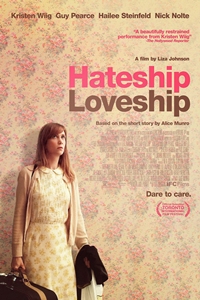
Hateship Loveship
Directed by Liza Johnson
Starring Kristen Wiig, Guy Pearce, Nick Nolte and Hailee Steinfeld
From IFC Films
Rated R
104 minutes
Wiig ditches comedy for cerebral character study
by Michael Clawson of Terminal Volume
Teenagers trick a homely live-in maid into thinking a down-on-his-luck man with a drug problem has a crush on her. The teens keep the ruse going through an elaborate series of letters and emails, each of which ignites the passion of their victim, who eventually steals some furniture, cashes out her bank account and relocates hundreds of miles away to start a new life with her unsuspecting pen pal.
Hateship Loveship isn’t a comedy, though I certainly thought it was, especially when I saw Kristen Wiig’s name in the opening credits. The first scene shatters your expectations: an elderly woman turns to her caretaker and says she wants to wear her blue dress. When the caretaker returns with the dress, the woman is dead. Before she calls the police, the caretaker dresses the woman in the blue dress in a final act of humanity and love.
The caretaker is Johanna (Wiig) and she finds another job caring for a widowed man (Nick Nolte) and his granddaughter, Sabitha (Hailee Steinfeld), who treats her with a mixed bag of petulance and boredom. Sabitha’s father, Ken (Guy Pearce), comes around every couple of months, though he’s not welcome to stay over because he’s a drunk and an addict. After one of his visits, Sabitha and a friend hatch their plot to fool Johanna. The trick works marvelously: after a dozen or so letters, Johanna shows up to Ken’s place in the middle of the night and finds him passed out in bed. She doesn’t know what to do, so she starts cleaning. The next morning he’s in for a shock.
Liza Johnson’s delicate film, based on a short story by Alice Munro, plays out in what can only be described as a funereal crawl. It’s the kind of movie that shows Johanna unpacking her bags, but doesn’t cut away to abbreviate the scene. No, you see her take out a sweater, find a place for the sweater, and then return to the suitcase for more items. When she shows up to meet Ken, she wanders through the dumpy hotel he owns and the movie goes to great lengths to show her knocking on each of the doors, turning on doorknobs, hollering through windows. Some of it feels like unnecessary padding to the runtime, but other parts open a lonely window into Johanna’s soul.
Wiig, wearing her best June Cleaver outfits, mumbles much of her dialogue in quiet little bits. Her Johanna doesn’t seem entirely aware of the world around her; the word “aloof” comes to mind. Early in the film, she tries on a dress at a clothing store and whispers to herself, “It’s probably what I’m going to be married in.” At this point you’ll think she’s either emotionally unstable or just terminally sad and alone. The film begs for your empathy, though some viewers will feel pity — neither emotion is wrong.
This slow-moving, deeply nuanced picture’s turning point is at Ken’s hotel, where he slowly finds himself won over to Johanna’s kindness. There is no promise of a relationship, or marriage, or commitment. Johanna shows up, realizes she’s been tricked and then never leaves. And Ken never asks her to leave. The bond they form is pure, even if what led them together was not.
Central to the story is Wiig, who doesn’t really act in the film — she mostly witnesses. I think she smiles twice, and maybe frowns once. She gives Johanna no personality because Johanna doesn’t have one. She simply lives, and feels, and admires — everything — from an internal mechanism that the viewer is not granted access to enter. It’s an honest performance, one that will stump some viewers and obliterate others. I think it’s exquisite.









